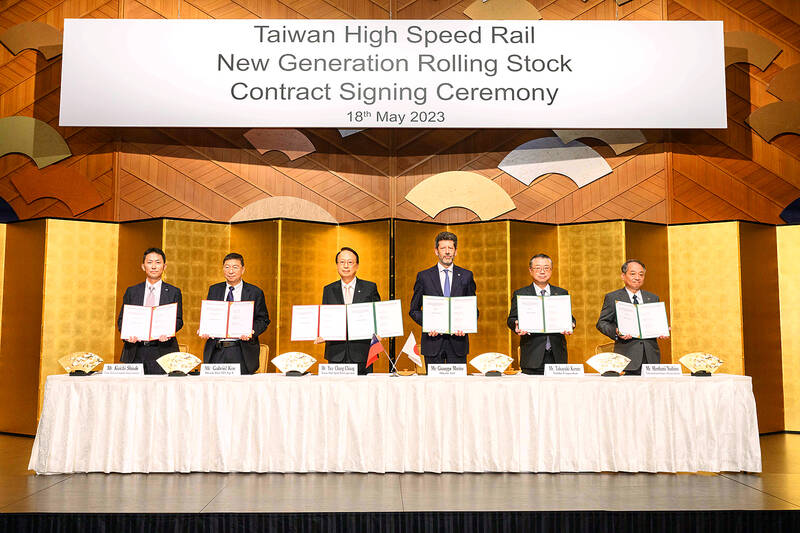Taiwan High Speed Rail Corp (THSRC) and Hitachi Toshiba Supreme Consortium in Tokyo yesterday signed a procurement contract for next-generation high-speed trains.
THSRC’s board of directors in March passed a resolution authorizing management to spend about NT$28.5 billion (US$926.35 million) to procure 12 next-generation high-speed trains from the Japanese firm.
Representative to Japan Frank Hsieh (謝長廷), Deputy Minister of Transportation and Communications Allen Hu (胡湘麟) and executives from the two firms attended the ceremony.

Photo courtesy of Taiwan High Speed Rail Corp
THSRC chairman Chiang Yao-chung (江耀宗) told the ceremony that high-speed rail services in Taiwan are a result of Japan’s Shinkansen system being successfully exported.
“Since Taiwan’s high-speed rail was launched in 2007, total passenger volume has exceeded 770 million,” Chiang said. “Operations have recovered rapidly as the COVID-19 pandemic has eased. Last month, the daily average of passengers accessing the system was 207,000, an all-time high,” he said.
“Modeled after the latest N700S, the new trains would enhance THSRC’s transport capacity and provide passengers with higher-quality services,” he said.
Next-generation rolling stock is expected to be delivered in batches starting in 2026 and the new trains are to begin operations in 2027, THSRC said.
Compared with the existing 700T trains, the new trains are more energy efficient, as they are lighter and are more streamlined, it said.
Each passenger seat would be equipped with a 110V charging socket, the company said.
Cabins would be equipped with full-color LCD information displays, arrival lights and two-tier luggage racks, the company said.
Chinese-language media reported that the first two tenders for the procurement contract failed because Japanese firms offered NT$5 billion per set of trains.
The deal was finalized after the price was reduced to NT$2.3 billion, the reports said.
Last year, Japanese House of Representatives member Keiji Furuya, chairman of the Japan-Republic of China Diet Members’ Consultative Council, raised the issue of THSRC’s procurement of new high-speed rail cars from Japan at a meeting with President Tsai Ing-wen (蔡英文).
The high-speed rail system “is a symbol of the solid friendship between Taiwan and Japan, for which the two countries must cooperate,” Furuya said at the time.

Taiwan is to commence mass production of the Tien Kung (天弓, “Sky Bow”) III, IV and V missiles by the second quarter of this year if the legislature approves the government’s NT$1.25 trillion (US$39.78 billion) special defense budget, an official said yesterday. Commenting on condition of anonymity, a defense official with knowledge of the matter said that the advanced systems are expected to provide crucial capabilities against ballistic and cruise missiles for the proposed “T-Dome,” an advanced, multi-layered air defense network. The Tien Kung III is an air defense missile with a maximum interception altitude of 35km. The Tien Kung IV and V

The disruption of 941 flights in and out of Taiwan due to China’s large-scale military exercises was no accident, but rather the result of a “quasi-blockade” used to simulate creating the air and sea routes needed for an amphibious landing, a military expert said. The disruptions occurred on Tuesday and lasted about 10 hours as China conducted live-fire drills in the Taiwan Strait. The Civil Aviation Administration (CAA) said the exercises affected 857 international flights and 84 domestic flights, affecting more than 100,000 travelers. Su Tzu-yun (蘇紫雲), a research fellow at the government-sponsored Institute for National Defense and Security Research, said the air

Taiwan lacks effective and cost-efficient armaments to intercept rockets, making the planned “T-Dome” interception system necessary, two experts said on Tuesday. The concerns were raised after China’s military fired two waves of rockets during live-fire drills around Taiwan on Tuesday, part of two-day exercises code-named “Justice Mission 2025.” The first wave involved 17 rockets launched at 9am from Pingtan in China’s Fujian Province, according to Lieutenant General Hsieh Jih-sheng (謝日升) of the Office of the Deputy Chief of the General Staff for Intelligence at the Ministry of National Defense. Those rockets landed 70 nautical miles (129.6km) northeast of Keelung without flying over Taiwan,

A strong continental cold air mass is to bring pollutants to Taiwan from tomorrow, the Ministry of Environment said today, as it issued an “orange” air quality alert for most of the country. All of Taiwan except for Hualien and Taitung counties is to be under an “orange” air quality alert tomorrow, indicating air quality that is unhealthy for sensitive groups. In China, areas from Shandong to Shanghai have been enveloped in haze since Saturday, the ministry said in a news release. Yesterday, hourly concentrations of PM2.5 in these areas ranged from 65 to 160 micrograms per cubic meter (mg/m³), and pollutants were